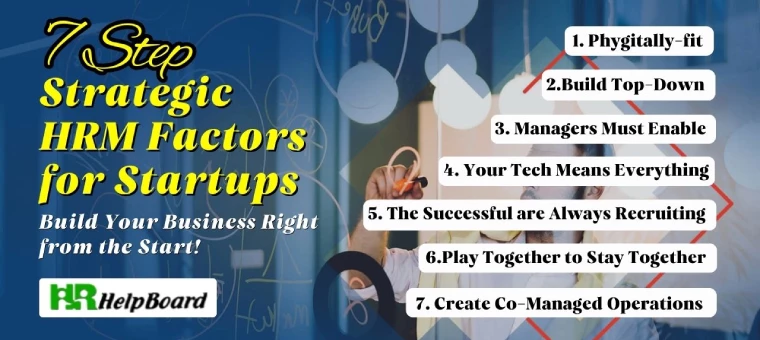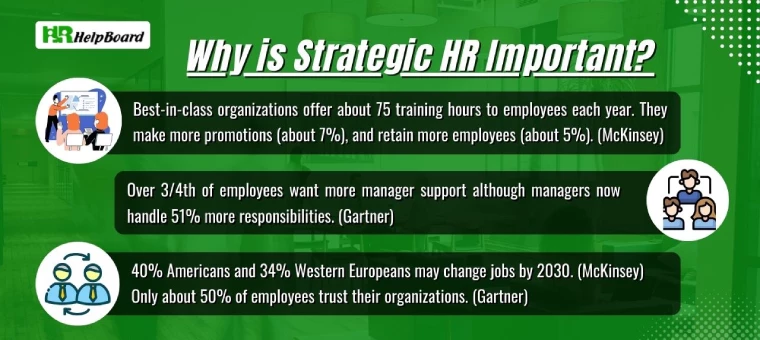Startup businesses have it hard in the world today for many reasons. One of the biggest is recruiting people who want to work with enthusiasm and plan to stick with the company. Not only this, but startup companies also need a strategic HRM structure to work effectively and mitigate damage from the loss of employees. So, if you are a startup entrepreneur in 2024 experiencing recruitment woes, we feel you!
The good news is that we have brought together the best strategic HR insights for startups in this blog. We will look into everything right from recruitment to retention and even replacement after termination. Along with this, we will look at factors like job satisfaction and increasing employee engagement organically. We will also look at advice from global experts via major consultancies like McKinsey and upcoming HR businesses like BambooHR to understand their formula for success. Let’s begin:
Table of Content

Organizations must learn to deliberately create moments of connection in a hybrid “phygital” world and rethink how to integrate the best of both worlds into their people development.
---------------- McKinsey blog
The post-pandemic era has made human resource management a lot more complicated than it was before. While there is a stark benefit from getting into the gig economy as a trusted remote work provider, nothing really beats the in-office work process. The market remains divided on that front and the most skilled professionals often tend to favor work from home.
So, how does a startup entrepreneur go about making their strategic HR planning not just include great working terms but also create robust collaborative mechanisms? Well, it depends on how you really want to work. The most popular option for startups is the phygital option. The majority of the workforce operates from a physical office while about 30% or less of them operate remotely. Mostly, remote workers would spend a day or two per week at the office for planning and orientation. Aside from that, they can keep in regular communication with their managers and supervisors to keep projects on track.
If you want to get a 100% WFO startup, then getting the right personnel may take longer. Also, you will need to orient their work process and create the right office ambience to derive the most from their in-office presence. For most businesses, strategic HR management means an equal blend of creativity and processing efficiency via tech setups like workstations works the best. Check out this blog by Bain & Co. on phygital workspaces for more info on this topic!
One of the biggest advantages that startup entrepreneurs have is that they can build their businesses correctly. The open canvas allows for a lot of experimentation and innovation but also carries the risk of failure. However, the right entrepreneur converts opportunity and risk into a solid enterprise proposition. This is the key to building a strong HR framework for your business. Even if you are just starting out, establishing a strategic HR planning framework to enable strategic delegation of tasks and responsibilities is crucial. A lot of early startup leaders struggle with not having the right support system to get their projects done successively. The solution to this is to continually dynamize project roles and responsibilities to enable effective management.
Once you are past the double digital mark for your business employee, it is time to get a dedicated HR. Many new entrepreneurs make the mistake of thinking they can handle these tasks themselves. However, the expert opinion on this Entrepreneur blog is that all startups should invest in a dedicated HR role. The dedicated HR also helps entrepreneurs develop a dynamic HR transformation process so that when the company grows, it integrates new roles easily along with any emerging tech. Check out our HR transformation blog for details on how this works.
Moving down from the executive, the managerial level in startups today demands a more robust and dynamic approach. Managers must have both the executive intelligence and trust to execute projects along with hands-on expertise in performing tasks. According to this Gartner 2024 HR focus study, managers are finding it harder to do their jobs. Employees are demanding more manager support while the managers are increasingly overburdened and cannot give them the added support they need. The solution here from the strategic HR management perspective is revamping the management process at the mid-level, setting realistic expectations and ensuring comprehensive support throughout the business pipeline.

Further, the same study quoted above mentions change management as crucial for effective strategic HR practices. Naturally, the managerial role also requires that startup companies create an insightful change management process. Since they need to adopt and integrate emerging tech and related processes, they must ensure employees are ready for the transformation. This is particularly true for startups since they grow much faster than mid-level enterprises. Also, studies suggest this enables companies to create dynamic opportunities that larger businesses may not have the agility to capitalize on.
Managing human resources for startups demands integrating a Human Resource Management System early. This type of software helps in managing all aspects of the HR management process. Even for startups, the benefits are considerable particularly when it comes to policies, payroll and employee reassigning/replacement. Further, certain HRMS help startups undertake and manage training processes. This is crucial for people development as highlighted by consultancies like McKinsey. Also, it directly impacts employee retention rates which is one of the strongest indicators for a startup’s success.
Further, the tech infrastructure must sync with the HR software you are applying. Files relating to the work process and reports in the work volumes are directly part of the employee appraisal criteria. As such, the HRMS should include the ability to import and maintain records based on direct work reports. For startups, this is a good foundation to work with since it confers the ability to unify and synchronize all HR processes through one interface. Here’s an HR checklist for startups by BambooHR to help you get started on your startup HR setup.
Startup companies are fast-growing businesses and creating momentum requires recruiting skilled professionals. To some degree, working up a regular recruitment process and screening through local talent like interns. This will help develop a working rapport with local institutions and also create a talent pool that companies can select recruits from. Further, utilizing local connections helps create a presence in the market which bolsters organic activity online. Companies can also create recruiting-related UGC content to help promote their products/services/recruitment opportunities online.
Another important factor for startups that want to grow has to do with generating creativity and innovation. Hiring people for both on-site and hybrid jobs in full—time roles and internships is a good way to create dynamism. Having a revolving roster of interns to work on innovative projects is a good way to take in ideas from new places while retaining the consistency of professional performance. In case your strategic HR planning involves taking a hybrid approach to internship, here’s a great article for B2B sales and managing workflow in a hybrid environment by McKinsey.
This might be a bit of a shocker to entrepreneurs and SMBs but most businesses do not get the most out of their employees because of lack of engagement. In fact, according to this Gartner HR Research, only 31% of employees report they are engaged, enthusiastic and energized by their work. This is one of the biggest hidden costs that many early to mid-level businesses tend to suffer from. The biggest reason for this lack of enthusiasm is a disconnect between employees and managers leading to dissonance in work and understanding of goals.
For startups, maintaining high productivity and growth is crucial for creating lasting momentum. Usually, businesses tend to have a layover between projects and this period is better used to consider strategic HR reviews for performance. The direct feedback loop also makes employees take more of an active role in projects. This helps create robust communication processes and brings out the best of ideas in your team.
One of the biggest reasons why startup business tend to fail is because they do not leverage expertise effectively. The best way to ensure that ideas make it to the production stage and finally the product end is to blend supervisory oversight with hands-on expertise. When managers share the same skillset as their subordinates, they tend to work more effectively together. Check out this article by The Guardian to get insights on how managers can capitalize on their skills to deliver considerable performance.
Strategic HR policies for startups must lean towards attracting, engaging, retaining and transforming human resources consistently. Leveraging technology and feedback allows both entrepreneurs and dedicated HR execs to create the right environment for long-lasting business value. If you’d like help in framing your HR plan, consider checking out our HR resources and stay regular with our blog of or more insights!
HR Planning - How to Manage Your Leave Policy Structure HR planning is a crucial part of every business and one of its core elements is handling the leave structure. As per Forbes Advisor...
Mastering Leadership: The Three C's of Success In today's world, everything is changing, and leaders are the people who direct these changes in organizations. Good leaders are goo...
Human Resource Planning - Making Your Employees Secure after the Great Resignation Human resource planning process after the Great Resignation is something of a minefield to walk through....
Human Resource Planning: 5 Steps to Better Hybrid or Remote Working Remote work and hybrid work have become a part of business like never before. Now, if you want to grow, you have to bri...
DEI in Corporate HR: A Mental Health Perspective Business workforce diversity has become a major topic for all kinds of enterprises. On one hand, DEI activities and initiatives enhance th...
HR Coordinator for Startups: Why Entrepreneurs Should Invest in this Job Role in 2024? Startups are the ideal dream for every entrepreneur in the world. But a dream is only as good as the...
Strategic HR for Startups: How to Discover, Recruit and Engage High-Value Talent in 2024 Startup businesses have it hard in the world today for many reasons. One of the biggest is recruit...
Intern Hell: How to Avoid Dooming Yourself on Your First Job Getting an internship is hard work, particularly when you want the right job that will help you grow and learn. In 2024, if yo...
Worried About Your Employee Appraisal at Work? These Performance Management KPIs Will Help You Outperform Everyone! Employee performance appraisal is easily one of the most dreaded sessio...